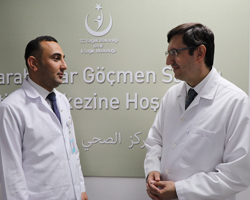Turkish and Syrian health workers stand together to deliver health services for refugees

WHO
Before joining the Refugee Health Training Centre in Izmir, Turkey, in 2017 as Chief Doctor, Dr Umit Sezginer had never worked closely with anyone speaking a different language. He had devoted more than 10 years to delivering health care in several hospitals of this coastal city, but he felt he still had much to give to support the Syrian population in Turkey. Language, however, was a significant barrier. “The job was not easy in the beginning,” he explains. Turkish health-care workers could not communicate easily with Syrian patients and interpretation was doubling the time required for consultations. “This can become tiring for both the doctor and the patient, and more importantly, it can lead to miscommunication during medical examinations.”
This scenario changed with the introduction of a programme that trains Syrian health professionals to work in the Turkish health system, alongside Turkish colleagues. Now, working hand in hand with Syrian doctors at the centre, Umit feels empowered to deliver quality health-care services that overcome both language and cultural barriers. His Syrian colleagues are health professionals trained by WHO in support of the Ministry of Health, to serve in the Turkish health system and provide health services in Arabic to their fellow nationals. Upon completion of their theoretical and practical training, these professionals are hired by the Ministry of Health in several health centres across the country.
“Despite the different languages, we have learned how to work together,” Umit explains. “We respect each other and share good moments as colleagues.” Whether over lunches, evening meals during Ramadan or playing shoulder to shoulder in football games, Umit and his team of Syrian health professionals are an example of how integration can help achieve the best results for refugee patients.
Ramy is one of the Syrian health-care workers who joined Umit’s team in 2017. After going through an intense set of theoretical trainings, Ramy found the guidance he needed from Umit. “We learned the functioning of health institutions from Turkish health professionals,” Ramy says. “Their support was essential to understand the system.”
After completion of the training, Ramy was hired by Izmir Refugee Health Training Centre. With almost 7000 health consultations per month delivered to Syrian refugees in the centre, the team do not have a moment to waste. “Being a doctor requires effective communication,” explains Umit. “It is important to understand a patient’s complaints clearly and Arabic-speaking doctors help us to bridge that gap and provide good health services.”
Making a difference in the lives of Syrian children and families
When it comes to the specific services that the centres provide, the 2 doctors share the same enthusiasm about making a difference in the lives of Syrian newborns. Umit and Ramy proudly talk about the long-term impact of the infant screening programme on the youngest Syrian refugees. As part of the programme, a blood sample (heel lance) is taken from newborns to detect 4 specific metabolic diseases. If the test results signal a risk for the newborn, families are referred to hospitals for further examination.
Ramy explains that this is one medical practice that was absent from Syria’s health-care system. “Thanks to the mentorship of Umit, now I understand how this works and I have the chance to introduce it to the patients,” he says. “This is only a small part of the work we carry out at the centres but its impact on the Syrian families’ well-being is invaluable.”
World Refugee Day: the right to health means leaving no one behind
World Refugee Day offers an annual opportunity to commemorate the strength, courage and perseverance of millions of refugees – including the more than 3.6 million Syrian refugees living in Turkey.
It is also an opportunity to remember that the human right to health means leaving no one behind, regardless of their race, ethnicity, sex, age, country of origin or legal status. This is what Turkish health professionals demonstrate every day with their dedicated support to their Syrian colleagues.
The WHO Refugee Health Programme in Turkey established this synergy and human bond. This would have not been possible without the generous contributions of partners supporting the Programme: Germany, through KfW Development Bank; the European Union Regional Trust Fund in Response to the Syrian Crisis; the Bureau of Population, Refugees, and Migration of the United States Department of State; and the Government of Japan.



